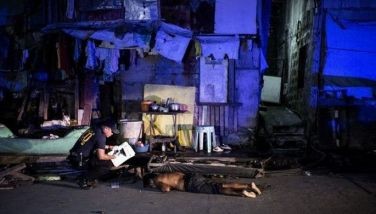Federalism was Duterte’s campaign promise

It would be disappointing if Duterte would end his presidential term without fulfilling Charter change for federalism. That was a promise he made because he understood that unless we change our unitary presidential form of government, we would not be able develop the Philippine nation.
A group of citizens has organized to make it possible. The group called the Road to Federalism sends messages on Facebook but I am not convinced that their efforts at organizing other groups or events will succeed. Former Chief Justice Reynato Puno is actively supporting the group.
Federalism is an issue of leadership rather than the number of followers one can gather, much like what we refer to as the “practice of democracy.” We are democratic because we believe in it as a concept despite its faulty structure. The Greeks understood that when they included non-aristocrats into government, including the demos or the common people.
The Philippines has scholars who study the concept of a federal government for the country. It was first suggested by José Rizal, the Philippines’ national hero. He outlined his vision of federalist governance in his essay Filipinas dentro de cien años (“The Philippines a century hence”) that was published by the Barcelona-based propaganda paper La Solidaridad in 1889.
This was followed in 1899, Emilio Aguinaldo and Apolinario Mabini, both were our early Filipino revolutionaries. They envisioned that the Philippines should have a federal government with power divided between the central government and local state governments. They were unable to fulfil that idea under colonial government. That is why the Philippines is under a unitary form of government, with power and authority vested in the so-called “imperial” Manila.
Under the revolutionary plans of our thinkers and heroes, we would have divided the islands into three federal states – Luzon, Visayas and Mindanao. That was not to be when our colonialists decided on a unitary government.
But it was not a lost idea. It continues to have its adherents, who persist to this day to work to fulfil the dream of our heroes.
One of the first proponents of federalism in the Philippines in the 21st century is professor Jose Abueva from the University of the Philippines, who argued that a federal form of government is necessary to more efficiently cater to the needs of the country despite its diversity. To achieve federal government we would have to amend the Cory Constitution and the oligarchs who espoused the unitary system.
The primary goals of a constitutional amendment would be to increase decentralization, give greater local power and access to resources especially among regions outside Metro Manila, which has long been dubbed as imperial.
Aside from Abueva, the late senator Aquilino Pimentel Jr. and former Speaker Jose de Venecia Jr. were also prominent supporters of federalism. They persisted in pushing the idea and were organized since 2001 to advocate for federalism. All three and their allies were convinced that federalism would solve the Mindanao crisis.
But it was not to be and once again it was for personal political reasons. However, in 2009, after Senate and House resolutions supporting Charter change were released, an estimated 13,000 to 15,000 people gathered in Makati to protest against these executive department-proposals for constitutional reform which included federalism. The scuttlebutt spread by anti-reformists was then Philippine president Gloria Macapagal-Arroyo, who organized a commission to tackle the issue, would use such amendments to extend her hold in office.
So here we are in Duterte’s time as president.
He launched a nationwide campaign calling for Charter change for federalism. During his visit to Cebu City in October of the same year, Duterte stated that federalism will facilitate better delivery of services to the people. He was from Mindanao and he knew why we would not progress unless we divided political power. He knew as many truly patriotic citizens who believed that the current system was “antiquated,” where distribution of public funds is disproportionately biased towards Manila. It is time we had a president from Mindanao, most everyone said.
Aside from the economic aspect, federalism is also seen as the best means to address problems in Mindanao, which suffers the most from ethno-religious conflicts. Duterte added that the current unitary form of government has not worked well, given the ethnic diversity in the country.
In spite of initially rejecting several calls for his candidacy for the 2016 presidential elections, he cited his organizational reforms if he were to become president. The most important of these was for federalism. He also planned to privatize tax collection and abolish the Congress to make way for a unicameral legislature.
It is not surprising big business has already declared it is opposed to federalism.
- Latest
- Trending
























